2021/04/08
Event Report: The Event Celebrating the Launch of “State of Global Islamic Economy Report 2020/21”
Yano Research Institute Ltd. (Headquarter: Nakano-ku, Tokyo) held a webinar of the event celebrating the launch of “State of Global Islamic Economy Report 2020/21” (SGIE Report) with the cooperation of DinarStandard, for the first time in Japan on January 26, 2021.
SGIE Report is created by and released by DinarStandard every year with the support of The Dubai Islamic Economy Development Centre (DIEDC), and 2021 is the 8th year from the onset of the publication. This report analyses the market size, potential growth, investment trends, and future business opportunities in following 7 sectors: Halal food, Halal cosmetics, Halal medicine, tourism by Muslim, Islamic finance, modest fashion, and media/entertainment. This series of reports is utilized by government bodies of countries all over the world, global companies, and international organizations including Japan. The report includes Global Islamic Economic Indicator, a ranking indicator that measures a benchmark of each country regarding the development of Islamic economic sector and supportive eco system. This year, the size, status of rules and regulations, degree of awareness, and social impact of Islamic economy/Halal market in 81 countries were analyzed.
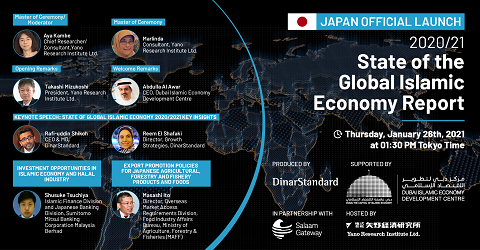
<The World Trends of Islamic Economy: Muslim Consumption Expenditure to be Expected to Recover by the End of 2021 and Increase to USD$2.5 trillion; and Islamic Financial Assets to be Expected to Expand to USD$3.7 trillion>
- While Muslim tourism industry was influenced by the coronavirus crisis, Halal food industry maintained the similar level as 2019.
- The total investment amount in the companies related to Islamic economy in the 2019-20 year was USD$11.8 billion, decreased by 13% from the previous year. However, the total investment amount in the companies related to Halal food increased to USD$6.1 billion.
- Signs of major investment opportunities were observed in such areas as the tokenization of sukuk (Islamic bonds), change of supply chains, investment in food security, demand of nutritional supplementary food, domestic travel, and acceleration of digital transformation (DX).
- Islamic economy including Islamic food industry is expected to show the sign of recovery by the end of 2021. Muslim consumption expenditure that was USD$2.02 trillion in 2019 is forecasted to rise to USD$2.4 trillion by 2024, and Islamic financial assets that was USD$2.88 trillion in 2019 is forecasted to increase to USD$3.69 trillion by 2024.
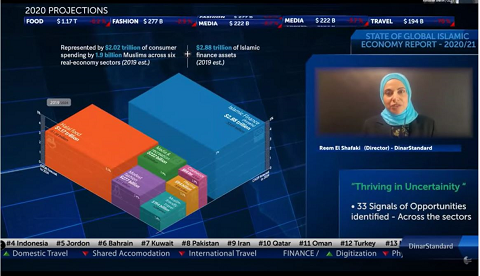
The influence caused by the COVID-19 crisis will be a driving force for each industry to shift to/develop new markets, and the large consumption capacity of 1.9 billion of Muslim population is further expected to be an important factor to make the global consumption market grow in the state of post-COVID-19 “new normal.”
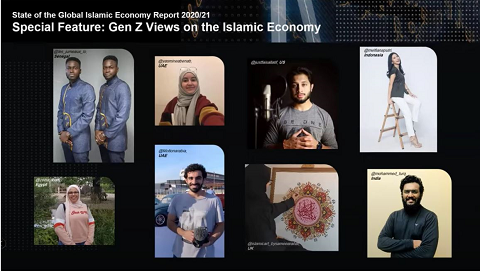
<Opening Remarks: Muslim Market, a New Investment Opportunity for Japanese Companies>
In the webinar held on January 26, Takashi Mizukoshi, the President of Yano Research Institute Ltd., the organizer of the event, made an opening speech about the possibility of Muslim market. He stated, “Muslim market is one of the big possibilities in the current trends of globalization, and from a long-term perspective, now is the time to start new investment in Muslim market.”
Subsequently, Abdulla Al Awar, the Chief Executive Officer of the Dubai Islamic Economy Development Centre (DIEDC), mentioned that although being largely affected by the coronavirus crisis, Islamic economy made a rapid recovery, and especially, Halal food market would further grow in the future, which would results in more investment opportunities for Japan.
<Keynote Speech by DinarStandard, “Reporting on “State of Global Islamic Economy Report 2020/21””: Investment Opportunities for Halal Food Market and FoodTech to Expand – Japanese Companies’ Investment to be Expected>
Rafi-uddin Shikoh, the CEO and Managing Director, and Reem El-Shafaki, the Director of Growth Strategies of DinarStandard reported the research results of the Islamic economy trends in the world in the 2020-21 year. It was reported that even though Islamic economy was largely impacted by the COVID-19 crisis, investment in Halal food industry and other relevant industries had been broadened and Muslim consumption expenditure would increase, which means that Halal industry and the demand for relevant funds would further expand in the future.
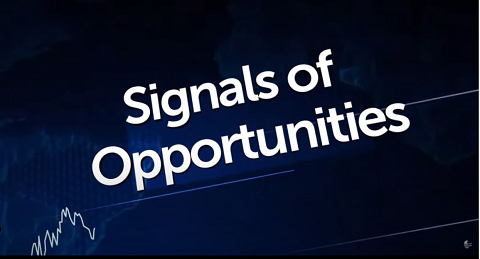
<Speech on “Islamic Finance” by Sumitomo Mitsui Banking Corporation Malaysia Berhad: “Islamic Finance” as a Tool to Take in the Growing Muslim Market>
Tetsuya Kainaka, the CEO of Sumitomo Mitsui Banking Corporation Malaysia Berhad, spoke that the company entered Islamic finance market in 2014 and the number of customers of the company’s Islamic financial services had been increasing every year. Then he concluded the greeting speech saying that the company would put further effort into the services in the future. Subsequently, Shusuke Tsuchiya, Islamic Finance Division and Japanese Banking Division of the same company, explained the basics of Islamic finance based on his business experience in Malaysia. He cited following two of the significant reasons for Japanese companies to do businesses by use of Islamic finance: “the inflow of investment from the Middle East” and “Taking in the Growing Muslim Market.”
<Speech on “Export Promotion Policies for Japanese Agricultural, Forestry and Fishery Products and Foods” by Overseas Market Access Requirements Division, Food Industry Affairs Bureau, Ministry of Agriculture, Forestry & Fisheries: Export Promotion Policy for Japanese Agricultural, Forestry and Fishery Products and Foods Entering the Expanding Global Food Markets – Export of Agricultural and Fishery Products and Foods for Member Countries of the Organisation of Islamic Cooperation (OIC) is in the Trend of Expansion>
Masashi Ito, a Director from the Overseas Market Access Requirements Division, Food Industry Affairs Bureau, Ministry of Agriculture, Forestry & Fisheries, delivered a lecture about the export promotion policies for Japanese agricultural, forestry and fishery products and foods.
According to Masashi Ito, the Ministry had been taking effective measures mainly to cope with regulations of destination countries, and to support Japanese export companies to take necessary actions to cope with such regulations, in order for Japanese agricultural and fishery products and foods to enjoy more benefit from the expanding and growing food markets inthe world, aiming at the development of sustainable domestic industries.
In this seminar, the common understanding among all of the speakers that the increase of population of Muslims and their consumption capacity would be steady even in the current situation of coronavirus crisis was found, and the such view and intention that their future businesses and industries would be further driven and developed by entering the growing Muslim consumption market was shared among the speakers and participants.
The video of the seminar in Japan as well as the events held in other 13 countries can be viewed here:
Japan Launch Event: State of the Global Islamic Economy Report 2020/21
Moreover, for those who would like to purchase a Japanese version of “State of the Global Islamic Economy Report 2020/21,” Yano released an abridged version (in Japanese). Please check the table of contents or some other information via the URL below:
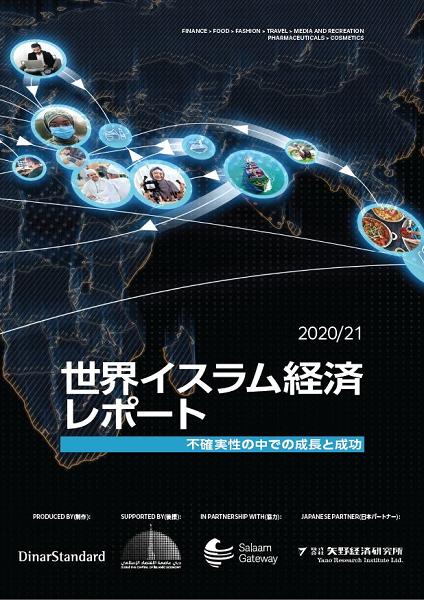
<Our Business and Services on Member Countries of the OIC (Islamic Economic Area)>
We will continue providing services to support Japanese companies to explore business and investment opportunities in Islamic economic area, one of the growing markets overseas. Please do not hesitate to contact us if you are interested in our research or support services regarding the Halal markets in the world, including the market of Indonesia (the world’s biggest Halal consumption market), Southeast Asia, Middle East, or North Africa.
<Our Principal Services>
- Market research, industry research, corporate research, consumer survey, and provision of other business information
- Support for companies to enter the markets in member countries of the OIC
- Support for companies to make business alliances with overseas local companies
- Support for companies to acquire Halal certification (in food, cosmetics, or medicine) with the supervision by Indonesia Halal Training & Education Center (IHATEC), the educational section of LPPOM MUI (Halal certification body in Indonesia)
- Training of companies to help acquire Halal certification (in food, cosmetics, or medicine) by IHATEC
- In-house training regarding Halal certification and Islamic market
<Contact>
Islamic Economy
Yano Research Institute Ltd.
(TEL): +81 3-6866-7186
(E-mail): halal@yano.co.jp
*What is Islamic economy?
Islamic economy is “the market that mainly provides products and services structurally influenced by Islamic ethics and laws” and has been promoting 1.9 billion Muslims’ Islamic faith-inspired ethical consumption needs. Muslim consumers are culturally diverse and geographically dispersed. This year’s report estimates that Muslims spent $2.02 trillion in 2019 in the fields of lifestyle products and services generally called “Islamic economy,” impacted by Islamic faith-inspired ethical consumption needs. (Source: State of Global Islamic Economy Report 2020/21)